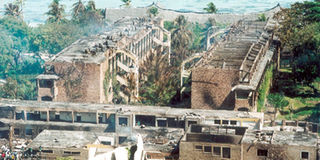Fazul man was freed by Kenyan court

Photo/FILE
Paradise Beach Hotel at Kikambala, Kilifi after the bomb attack. Musa Hussein Abdi was arrested in December 2007 in Mombasa during police operations targeting al Shabaab and al Qaeda operatives hiding in Kenya.
A Kenyan killed alongside terror mastermind Fazul Abdullah in Somalia last week had been arrested by police in Mombasa four years ago, but set free by a court.
The arrest of Musa Hussein Abdi, better known as Dheere, in December 2007 came during police operations targeting al Shabaab and al Qaeda operatives hiding in Kenya.
The raids were also carried out in Nairobi’s Eastleigh, South B and Nairobi West estates.
In Eastleigh, several grenades were recovered from the houses raided by the police, Dheere, who was shot dead together with Fazul by Somali forces at a roadblock in Mogadishu last Wednesday.
After the Mombasa arrest, Dheere was charged with illegal possession of explosives.
Two years later, he was freed by Kibera Chief Magistrate Uniter Kidula together with five accomplices — Ahmed Mohammed Osman, Omar Issa Noor, Mohammed Gedi Hussein, Mursal Abdirahman Hassan and Talib Abubakar — for lack of evidence.
Used an artificial leg
Dheere was an explosive expert who used an artificial leg.
His lawyers, Mbugua Mureithi and Harun Ndubi, had argued that when the police found the grenades in Dheere’s house, he was not present during the search, a reasoning that was upheld by the court.
The house was owned by Omar Awadh Omar who has been charged in a Uganda court over terror attacks that targeted crowds watching World Cup finals last year, killing 76 people.
On Monday, security officers who spoke to the Nation said the evidence they had gathered at the time would have sent Dheere in jail if Kenya had enacted conducive legislations.
Police commissioner Mathew Iteere said the Anti-terrorism Bill that has not been passed in Parliament would have been a favourable law to ensure the suspect was convicted.
“There was evidence against him, but a higher threshold of proof was required by the court going by the Act the suit was relying on. It was the option then,” he told the Nation.
The Prevention of Organised Crime Act, which has since come into existence, would also have been preferred, since al Shabaab — the terror group the two belonged to — has since been listed among the outlawed organisations.
Before the two men were killed, they were driving a pick-up truck full of medicine, laptops and mobile phones and $40,000 in cash.
According to Somali government officials, the pick-up truck approached the check point and “one of the two men pulled out a gun and the officers manning the checkpoint fired back, killing the two instantly.”
Fazul, believed to be about 38 years old, joined al Qaeda in Afghanistan and trained there with Osama bin Laden, the terror network’s leader, according to the transcript of an FBI interrogation of a known associate.
The US government had placed a $5m (about Sh400 million) reward on his head for alleged conspiracy to bomb the US embassies in Kenya and Tanzania in 1998.
Fazul was also suspected of planning the bombing of the Paradise Beach Hotel at Kikambala in Kilifi and a near-simultaneous attempt to shoot down an Israeli aircraft in November 2002.
In the Kikambala bombing, 15 people were killed and more than 80 injured. Fazul is said to have held citizenship in the Comoros Islands and Kenya.
He was indicted on September 17, 1998, in the a US federal court for his alleged involvement in the bombings of the US embassies.
Police spokesman Eric Kiraithe said: “This is the tragedy of the criminal justice system in this country.”




